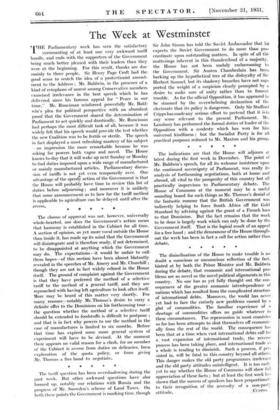* a * *
The disinclination of the House to make trouble is no doubt a conscious or unconscious reflection of the fact, hinted at by both the Prime Minister and Mr. Baldwin during the debate, that economic and international pro- blems are as novel as the novel political alignments in this country. No one has as yet fully thought out the con- sequences of the greater economic interdependence of nations which has resulted from the complicated structure of international debts. Moreover, the world has never: yet had to face the entirely new problems caused by a glut of commodities. The familiar experience of a shortage of commodities offers no guide whatever in these circumstances. The repercussion in most countries so far has been attempts to shut themselves off economic- ally from the rest of the world. The consequence has been that at a time when vast international debts call for a , vast expansion of international trade, the reverse process has been taking place,: and international trade as a whole is tending to diminish. Such a process, if per- sisted in, will be fatal to this country beyond all others. This danger makes the old party programmes irrelevant and the old party attitudes unintelligent. It is too early yet to say whether the -House of Commons will show full appreciation of theselacts ; but at least the first week h:e' shown that the success of speakers has been proportional, to their recognition. of . the .n.eeessity . of a non-party
































































 Previous page
Previous page